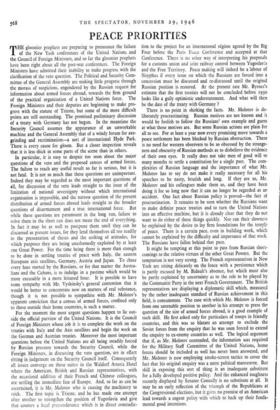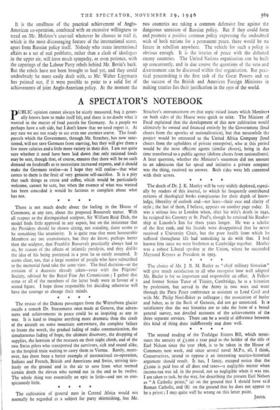PEACE PRIORITIES
THE gloomier prophets are preparing to pronounce the failure of the New York conferences of the United Nations and the Council of Foreign Ministers, and so far the gloomier prophets have been right about all the post-war conferences. The Foreign Ministers have admitted their inability to make progress with the clarification of the veto question. The Political and Security Com- mittee of the General Assembly are making little progress through the morass of suspicions, engendered by the Russian request for information about armed forces abroad, towards the firm ground of the practical organisation of a United Nations force. The Foreign Ministers and their deputies are beginning to make pro- gress with the statute of Trieste, but some of the more difficult points are still outstanding. The promised preliminary discussion of a treaty with Germany has not begun. In the meantime the Security Council assumes the appearance of an unworkable machine and the General Assembly that of a windy forum for axe- grinding and recrimination—a sort of international Hyde Park. There is every cause for gloom. But a closer inspection reveals that it is less thick in some parts of the scene than in others.
In particular, it is easy to despair too soon about the major questions of the veto and the proposed census of armed forces. The failure to reach any useful result so far is serious, but it is not fatal. It is not so much that these questions are unimportant. Indeed they may be regarded as the most important questions of all, for discussion of the veto leads straight to the issue of the limitation of national sovereignty without which international organisation is impossible, and the narrow question of the present distribution of armed forces abroad leads straight to the broader questions of disarmament and a true international force. But while these questions are paramount in the long run, failure to solve them in the short run does not mean the end of everything. In fact it may be as well to postpone them until they can be discussed as present issues, for they lend themselves all too readily to the presentation of theses and the striking of attitudes, for which purposes they are being unashamedly exploited by at least one Great Power. For the time being there is more than enough to be done in settling treaties of peace with Italy, the eastern European axis satellites, Germany, Austria and Japan. To chase every hare started by the Russians, or for that matter the Austra- lians and the Cubans, is to indulge in a pastime which would be more excusable in a more leisured hour. It is possible to have some sympathy with Mr. Vyshinsky's general contention that it would be better to concentrate now on matters of real substance, though it is not possible to sympathise with Mr. Molotov's apparent conviction that a census of armed forces, confined only to those outside their home countries, is such a matter.
For the moment the most urgent questions happen to lie out- side the official purview of the United Nations. It is the Council of Foreign Ministers whose job it is to complete the work on the treaties with Italy and the Axis satellites and begin the work on the German and Austrian treaties. Moreover the most important questions before the United Nations are all being steadily forced by Russian pressure towards the Security Council, while the Foreign Ministers, in discussing the veto question, are in effect sitting in judgement on the Security Council itself. Consequently all issues converge on those suites in the Waldorf Astoria Hotel where the American, British and Russian representatives, with the occasional addition of their French and Chinese colleagues, are settling the immediate fate of Europe. And, so far as can be ascertained, it is Mr. Molotov who is causing the machinery to stick. The first topic is Trieste, and he has made one attempt after another to strengthen the position of Yugoslavia and give that country a local preponderance which is in direct contradic- tion to the project for an international regime agreed by the Big Four before the Paris Peace Conference and accepted at that Conference. There is no other way of interpreting his proposals for a customs union and joint railway control between Yugoslavia and the Free Territory. Peace making will indeed be a labour of Sisyphus if every issue on which the Russians are forced into a concession must be discussed and re-discussed until the original Russian position is restored. At the present rate Mr. Byrnes's estimate that the first treaties will not be concluded before 195o looks like a gaily optimistic understatement. And what will then be the date of the treaty with Germany ?
There is no point in shirking the facts. Mr. Molotov is de- liberately procrastinating. Russian motives are not known and it would be foolish to follow the Russians' own example and guess at what those motives are. But some Russian actions are plain for all to see. For at least a year now every promising move towards a peace settlement has been blocked by Russian obstruction. There is no need for western observers to be so obsessed by the strange- ness and obscurity of Russian methods as to disbelieve the evidence of their own eyes. It really does not take men of good will so many months to settle a constitution for a single port. The com- plexities of Russian language and the importance of what Mr. Molotov has to say do not make it really necessary for all his speeches to be nasty, brutish and long. If they are so, Mr. Molotov and his colleagues make them so, and they have been doing it for so long now that it can no longer be regarded as an accident. One fact about Russian policy is proved—the fact of procrastination. It remains to be seen whether the Russians want to make definite peace treaties and to turn the United Nations into an effective machine, but it is already clear that they do not want to do either of these things quickly. Nor can their slowness be explained by the desire to lay firm foundations for the temple of peace. There is a certain pace, even in building work, which cannot be explained by the difficulty and importance of that work. The Russians have fallen behind that pace.
It might be tempting at this point to pass from Russian short- comings to the relative virtues of the other Great Powers. But the temptation is not very strong. The French representatives in New York are sitting delicately on the fence with a persistence which is partly excused by M. Bidault's absence, but which must also be partly explained by uncertainty as to the role to be played by the Communist Party in the next French Government. The British representatives are displaying a diplomatic skill which, measured by the rather inadequate standard of Russian achievement in this field, is consummate. The ease with which Mr. Molotov is forced from one untenable position to another in his attempt to press the question of the size of armed forces abroad, is a good example of such skill. He first asked only for particulars of troops in friendly countries, and this was so blatant an attempt to exclude the Soviet forces from the enquiry that he was soon forced to extend the enquiry to ex-enemy countries as well. The logical argument that if, as Mr. Molotov contended, the information was required for the Military Staff Committee of the United Nations, home forces should be included as well has never been answered, and Mr. Molotov is now employing smoke-screen tactics to cover the fact that his original enquiry was a mere political manoeuvre. But skill in exposing this sort of thing is an inadequate substitute for a fully developed positive policy. And the enhanced toughness recently displayed by Senator Connally is no substitute at all. It may be an early reflection of the triumph of the Republicans at the Congressional elections, but it gives no promise of an American lead towards a cogent policy with which to back up their funda- mental good intentions. It is the smallness of the practical achievement of Anglo- American co-operation, combined with an excessive willingness to tread on Mr. Molotov's coat-tail whenever he chooses to trail it, which is the most discouraging feature of the international scene, apart from Russian policy itself. Nobody who treats international affairs as a set of real problems, rather than a clash of ideologies in the upper air, will have much sympathy, or even patience, with the caperings of the Labour Party rebels behind Mr. Bevin's back. But the rebels have not been brought to heel yet, and they could undoubtedy be more easily dealt with, as Mr. Walter Lippmann has pointed out, if it were possible to point to a solid list of achievements of joint Anglo-American policy. At the moment the two countries are taking a common defensive line against the dangerous unreason of Russian policy. But if they could form and promote a positive common policy expressing the undoubted wish of both nations for a permanent peace, there would be no future in rebellion anywhere. The vehicle for such a policy is obvious enough. It is the treaties of peace with the defeated enemy countries. The United Nations organisation can be built up concurrently, and in due course the questions of the veto and disarmament can be discussed within that organisation. But prac- tical peacemaking is the first task of the Great Powers and on the success of the British and American Foreign Ministers in making treaties lies their justification in the eyes of the world.



































 Previous page
Previous page